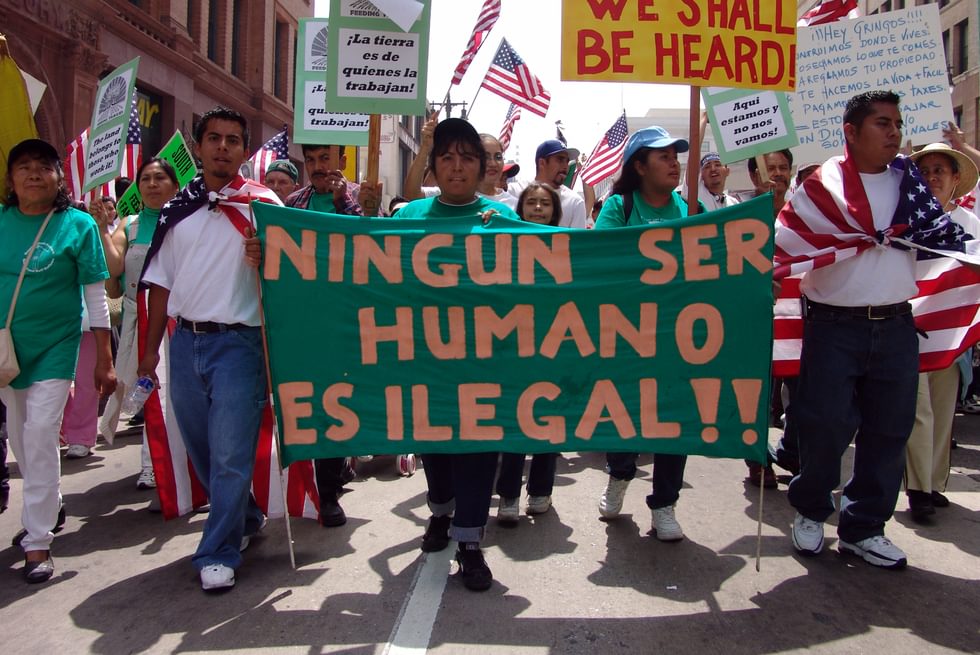The Red Underside of Blue States
From the Series: Im/migration in the Trump Era
From the Series: Im/migration in the Trump Era

As the current administration’s immigration policies have unleashed what some have called a “reign of terror on immigrants,” the bold actions of cities and states to resist this agenda have commanded the spotlight. Less attention, however, has been devoted to the stories of immigrants living in rural parts of Trump’s America, where city councils and local police have embraced expanded immigration policing. California’s so-called sanctuary state bill—signed into law on October 5, 2017—bars local and state law enforcement from cooperating with Immigration and Customs Enforcement (ICE) unless individuals have been convicted of at least one offense on a list of eight hundred crimes. Yet the Central Valley is the red underside of blue-state California, a region that defies California’s progressive sentiment. The Fresno County jail has an open-door policy toward ICE, and the city of Fresno—despite its highly diverse immigrant population—declined to proclaim itself a sanctuary city. Meanwhile, Fresno County’s northern neighbor, Madera County, is the defendant in an ACLU lawsuit that charges officials with secretly ordering the county jail to cooperate with ICE.
Mendota, a rural and predominantly Latino town in western Fresno County, provides a window into the challenges immigrants face in doggedly red pockets within blue states. According to the 2010 U.S. Census, Mendota is 97 percent Hispanic and 51 percent foreign-born. However, residents estimate that the number of immigrants likely doubles each summer during the harvest season. While immigrants comprise a majority of the town’s population, they are underrepresented on Mendota’s governing bodies and police force. In Mendota, immigrants are the casualties of heightened enforcement in a town that—although governed by second- and third-generation Latinos—has thus far refused to curtail immigrant-focused policing.
When I first came to Mendota in 2005, I was struck by the stories I heard from immigrant farmworkers about their hazardous and exploitative work conditions (see Horton 2016). Yet immigration enforcement topped farmworkers’ concerns this year. As I talked to Central American and Mexican immigrants in the town’s pool hall, I heard stories of a police force that seemed emboldened by Trump’s victory and his mandate to strengthen immigration enforcement. Although California grants driver’s licenses to undocumented immigrants, many of those I spoke with said they were too afraid to drive. I was also surprised to hear a common response when I introduced myself as a researcher from the University of Colorado. “Colorado,” one Honduran responded with interest. “Do they have laws more in favor of immigrants there?”
He had good reasons to ask. It is well-known that President Trump plans to expand the 287(g) program, which would deputize police to serve as federal immigration agents and which positions local police as the frontline of federal immigration enforcement. Unlike the big-city chiefs who are bucking Trump’s plans, police in this conservative region have embraced the possibility of expanded powers. In March 2017, city police ticketed a woman on her way to church for having overly tinted windows. Upon checking national databases and finding that she had a deportation order, they sent ICE to her home. In June, the city council quietly proposed a resolution (rumored to have been promoted by the police department) that opposes California’s sanctuary law and would allow police cooperation with ICE to continue. In July, residents—including many youths in mixed-status families—flooded the city council meeting to protest.
Yet the local police’s enthusiasm for immigration enforcement is not residents’ only concern. Farmworkers complain that police target their vehicles, inventing pretexts to ensnare those most likely to be undocumented. Mendota is laid out in a triangle, with two highways leading out to the fields on either side of town. Residents say that the police position their cars on these highways at the end of the workday, stopping farmworkers returning from the fields for license plates obscured by dust or broken tail lights. In the course of these stops, they issue tickets for more serious offenses—driving without a license, possessing open containers, or driving under the influence. “I’ve even heard of a guy getting ticketed for an ‘open container’ when he had empty beer cans lying on the bottom of the car,” says Don Wilfredo, a former field supervisor.
For undocumented immigrants and legal permanent residents, such tickets carry serious consequences. They lead to court dates and bookings in the Fresno County jail, which shares its databases with ICE, allows agents to enter and conduct interviews, and informs ICE of release dates. Accumulated unpaid tickets eventually materialize as arrest warrants. Multiple DUIs in California qualify as a “crime of moral turpitude” that will render legal permanent residents deportable. In red areas with jails and police that cooperate with ICE, routine traffic stops and tickets can be a pipeline to deportation.
The expansion of immigrant policing in Mendota has exposed generational, legal, and political divisions. As one city council member said to me after a July meeting marked by youth protest: “I’m a child of immigrants; a lot of my family is undocumented. But what am I supposed to do—tell the police not to do their job?”
As we celebrate the resistance of activists and city councils in urban areas, we should not forget the struggles of immigrants in the rural towns of Trump’s America. It is urgent for anthropologists to document the effect of expanded immigration enforcement, especially in areas that lack a countervailing sanctuary movement. Fieldwork in the red undersides of blue states—and especially in regions populated and sustained by immigrants—reveals the contradictions of the current political era. As Don Wilfredo pointedly put it, “After they deport all the immigrants, who do they think will pick the fruit in the fields?”
Horton, Sarah Bronwen. 2016. They Leave Their Kidneys in the Fields: Illness, Injury, and Illegality among U.S. Farmworkers. Berkeley: University of California Press.